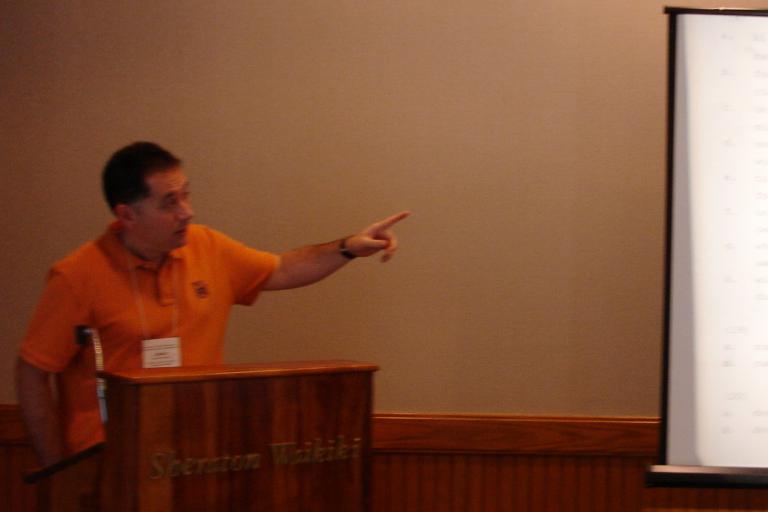Heinz Giegerich, from the University of Edinburgh, taught a five-hour seminar on various aspects of morphophonology and English metrics.
CV details
Heinz Giegerich arrived in Edinburgh in 1979 and has been Professor of English Linguistics in the Department of Linguistics and English Language since 1997.
Since completing his own PhD in 1983, on the theory of Metrical Phonology in relation to German and English, he has supervised a number of PhD students and has taught extensively at both undergraduate and postgraduate levels. His own research focuses on theories of phonological representation and derivation in relation to English and German. He has published a number of articles and books on English and German syllable structure, stress and rhythm within the theory of Metrical Phonology, as well as on the problem of constraining phonological derivations. More recently he has worked on the Lexical Morphology and Phonology of the two languages, developing the theory of 'base-driven lexical stratification'. His on-going resarch is increasingly concerned with morphology. Alongside 'real' research, he has for many years been interested in making the outcomes of research in English linguistics accessible to undergraduate students. He is currently preparing a long-overdue second edition of English Phonology (Cambridge University Press, 1992). For Edinburgh University Press he has founded (and is now General Editor of) the Edinburgh Textbooks on the English Language, a new series of introductory texts dealing with all major aspects of English Linguistics, and he has recently launched a new journal, Word Structure.
Abstract of the seminars
27 November
In these lectures, Giegerich looked at proposals to divide the grammar into two major modules – the syntax and the lexicon – and the latter into two ‘sub-modules’ or ‘strata’, in order to then analyse a number of phenomena that seem to straddle the divide between these modules – traditional ‘compounds’ and some Adjective-plus-Noun constructions not usually treated as compounds. To finish off, Giegerich discussed the generally assumed difference between compounds and phrases in terms of stress, and challenged the idea that compound stress is determined by structural geometry – “stress the right-hand element if and only if it branches”. He argued that these assumptions are wrong, and that phrases can have fore-stress or end-stress while compounds can have fore-stress or end-stress, in order to conclude that tree geometry has nothing to do with any of this, but the semantics does.
28 November
The first lecture focused on the link between speech prosody (‘rhythm’) and verse prosody (‘metre’) in English. Giegerich showed that in English, accentual metres are ‘good’ and syllabic metres are ‘bad’, and that the principal characteristics of the successful verse forms in English derive from the fact that English is a stress-timed language. The second lecture focused on Robert Frost’s Stopping by Woods on a Snowy Evening. Giegerich argued that, while most poems have two levels of interpretation – namely what the text says and what the poem ‘means’ – this particular poem has three. He showed that in Stopping there is a distinct level of interpretation containing what the text doesn’t and indeed refuses to say, and that the poem’s ‘meaning’ depends on this level.



